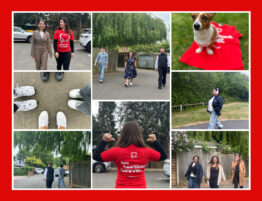
(Mental Health Awareness Week 2022)
After two years of the pandemic, where there has been much less direct contact with friends, family, colleagues or even with essential healthcare professionals, many people are feeling a greater sense of loneliness, isolation and disconnection from our altered society.
Responding to this, the Mental Health Foundation have chosen ‘loneliness’ as the theme of this year’s Mental Health Awareness Week which starts today. With construction workers being exposed to many of the same stress points in life as everyone else, we’re using this week’s blog to talk about loneliness in detail and provide a few tips as to what can be done to manage or overcome this problem.
Why is loneliness a problem?
First of all, let’s be clear that loneliness can affect anyone of us at any time. Aside from the issues associated with the pandemic (e.g. social distancing, home working etc) other causes might be bereavement, relationship breakdown, moving house, retirement or changing jobs. Sometimes there doesn’t seem to be a clear underlying cause but people still feel lonely.
While feeling lonely is not a mental illness on its own, loneliness can both lead to poor mental health concerns (e.g. anxiety or depression) and/or be the result of a pre-existing mental health problem, for example when someone who is experiencing high anxiety levels then becomes lonely.
Additionally, loneliness can lead to a wide range of emotional and physical problems like poor sleep, stress, memory problems, increased risk of stroke and heart problems, poor decision-making and higher risk of substance abuse.
In the construction sector, it’s been found that mental health issues are affecting workers significantly. HSE statistics show that stress, depression and anxiety accounted for 27% of all ill-health during 2021 and the charity ‘The Lighthouse Club’ report that two construction workers take their own lives every working day. As to why this might be, experts suggest factors such as lack of job security, prolonged work away from home in unfamiliar areas, separation from family, long hours and tight deadlines.
Managing loneliness
If you’re experiencing loneliness and want to actively do something to change that, here are some ideas which we’ve picked out from the charities, MIND and the Mental Health Foundation.
1. Reconnect with others
It may sound obvious but having meaningful connections with other people is hugely important in preventing or reducing loneliness. Experts say that having a few close friends can make a big difference. You might start with a phone call and then consider arranging an online chat or a coffee/tea date where you can catch up in person. For those who live further afield, perhaps you could start an online quiz/ game or monthly party.
2. Make new connections
Meeting new people might feel scary but be brave as this could really help if you feel like you don’t have enough satisfying social contact in your life. Joining a class/group based on your hobbies or volunteering are both good ways of meeting people who could potentially become new life-long friends. Or you could try an organised peer support group or befriender service where you can make connections with new people while helping and supporting each other through loneliness or related mental health problems. Check out the useful contacts section on MIND’s website for details of these kind of groups and services.
3. Seek therapy
While opening up to someone you know can sometimes be a great comfort, sometimes this is not enough to resolve more complex underlying issues around loneliness.
Experts say that if you’re feeling lonely more than once a week, feeling ‘empty’ or feeling ‘like you don’t belong’, this could be a problem which would benefit from some form of therapy/ counselling. Two of the most recognised are:
- Talking therapies – this allows you to explore and understand your feelings of loneliness and can help you develop positive ways of dealing with them.
- Cognitive behavioural therapy (CBT) – this may help if anxiety about social situations has led to isolation. Focusing on how your thoughts, beliefs and attitudes affect your feelings and behaviour, CBT can teach you coping skills for dealing with different problems.
4. Use social media wisely
While social media can be a great tool for keeping in touch with other people, being active in these environments can sometimes trick us into thinking we’ve got real connections which aren’t really there and in fact lead to increased loneliness. Try this approach:
- Use social media to make connections that go beyond likes, reactions and comments. You could play online games with family and friends or try out one of the apps that let you watch a show or movie with another person.
- Stop comparing yourself to others. We all do it, but it can really help to be aware that things are not always what they seem from the outside. On social media, we often only see what other people want to share about their lives, not the full picture.
- Be mindful of how much time you spend on social media, perhaps setting yourself daily limitations so as to make time to reach out to the real world.
5. Look after your mind and body
Feeling lonely can be very stressful and can have a big impact on your general health and wellbeing, which can then make it even harder to make positive steps forwards. Take some time to think about each of the following points and where you might be able to make changes:
- Try to get enough sleep (not too little and not too much).
- Think about your diet. Eating regularly and keeping your blood sugar stable can make a difference to your mood and energy levels.
- Do some physical activity. Exercise can be really helpful for your mental wellbeing and some people find it also helps improve their self-esteem.
- Spend time outside. Being out amongst nature can raise your mood and improve your wellbeing.
- Spend time with animals. Some people find spending time around animals can help with feelings of loneliness, whether through owning a pet or spending time around animals in their natural environment. You could try visiting a local community or city farm.
- Avoid drugs and alcohol. While you might want to use drugs and alcohol to cope with difficult feelings about yourself, they can prevent you from dealing with underlying problems and in the long run make you feel worse.
If you’re experiencing loneliness, take this moment to remember that this experience doesn’t have to stay with you for life. It’s possible that some of what we’ve included in this blog might help but be aware that different things work for difference people so take it slow and make sure to try what you feel most comfortable with. If something isn’t working for you right now, you can try something else, or come back to it another time.
For more information about Mental Health Awareness Week plus support around loneliness or other mental health issues, go to MIND, the Mental Health Foundation and Mental Health UK.
09.05.2022
Feature image: Pexels








